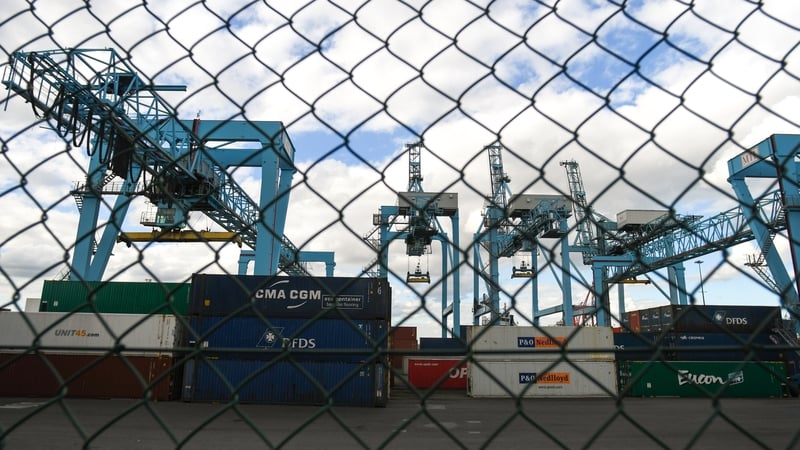Irish businesses that are involved in exporting goods to or through the UK have been urged to ensure that they are fully prepared for Brexit-related import controls that are being introduced from January 31.
Under the changes, affected firms will be required to pre-lodge customs declarations ahead of shipping products to Great Britain.
Agri-food exports will also have to be pre-notified to the UK authorities and in some cases they will have to be accompanied by an Export Health Certificate.
The additional documentation will come on top of the formalities already in place for goods that are being exported to the EU.
It is understood that Irish Government officials are confident that awareness and preparedness among medium to large Irish firms is good ahead of the introduction of the new requirements.
But there is less confidence that smaller traders have the resources and knowledge to be fully ready.
It is expected that shipments that do not have the required declarations submitted at least 24 hours or more in advance will not be allowed to board ferries from the morning of January 31.
However, Government sources said long delays at not expected at Irish ports following the commencement of the new system.
Physical checks at Border Control Posts of goods entering Great Britain from the Republic of Ireland will not begin until October 31 at the earliest, although that date has not yet been confirmed.
Over a third of Irish exports end up in the UK which is still the biggest single destination for Irish food, drink and horticulture exports.
47% of Irish beef exports with an estimated value of €1.3 billion go there, for example, while dairy exports to the UK were valued at €1.1 billion in 2023.
"The UK continues to be an important market for Irish exports so the smooth transition to these new UK requirements will be very important for us," said Tánaiste and Minister for Foreign Affairs and Defence Micheál Martin.

"I am encouraging all Irish companies to speak to everyone in their supply chain and make sure they are ready for the new UK processes starting 31 January," he added.
The import controls were set to be introduced on a number of occasions over recent years, but were repeatedly delayed because UK agencies was not ready.
The rules were finally published in August of last year and the expectation now is that the latest deadline for implementation of January 31 will be adhered to.
Irish Government officials have been engaging heavily with Irish exporters, logistics providers, ferry operators and others in recent months and have run communication and education campaigns.
Sources said there is strong evidence that those who need to are engaging in preparatory work ahead of January 31.
The Minister for Agriculture Charlie McConalogue said all businesses in the agri-food supply chain to Great Britain should engage with their UK customers, their local supervisory competent authority team and logistics providers to confirm necessary processes are in place.
The requirements do not apply to goods that are moving from Ireland to Northern Ireland, while qualifying goods originating in Northern Ireland will continue to have unfettered access to Great Britain.
The rules do apply though both to goods transported directly from Ireland to Great Britain or indirectly via Northern Ireland to Great Britain.
Under the new system, exports of live animals from Ireland will have to be pre-notified by the Great Britain based importer to the UK's food and feed SPS import system, along with animal products and high and medium risk category plant products.
Full customs controls will also be introduced, which means importer in Great Britain or their agents will have to have registered the load on the UK Customs Declarations System.
Hauliers will need a UK import declaration reference number to generate a Goods Movement Reference (GMR).
The UK Goods Vehicle Management System will also have to be used to add the import declaration reference and generate the GMR before departing for ports in Ireland.
Export Health Certificates will also be required on medium risk animal products, plants, plant products and high-risk food and feed of non-animal origin, which will involve exporters liaising with local veterinary inspectors.
It is expected that the UK authorities will adopt a pragmatic and educational approach to the changes initially, but ongoing consistent or deliberate breaches could result in penalties.
'Paperwork new and different'
Minister for Enterprise, Trade and Employment Simon Coveney said Irish business that are exporting into the UK need to inform themselves and make sure that they have their paperwork in order.
He Brexit seems like quite a long time ago, "but actually it's only from the end of January that we're seeing the UK applying new import conditions if you like for companies in the EU, ie Ireland, exporting into the UK.
"They will need to have pre-declarations in terms of customs, the paperwork is new and different. Most companies, by the way, are well aware of this and are ready, but those that aren't need to inform themselves and quickly."
Minister Coveney said a lot has been done in getting information out to companies.
"Don't forget Ireland prepared itself really well in the context of Brexit on goods coming into Ireland from the UK.
"We now need of course to do the same to make sure that our companies are supported in terms of exporting to the UK.
"We have a trading relationship with the United Kingdom that that's worth about €100 billion a year. So that's an enormous part of the Irish economy.
"Most of it will be unaffected by this, but some of it will be affected and so people need to inform themselves and I know that we're working hard to make sure that companies get the information that they need."
Minister Coveney said there is not going to be physical inspections in UK ports on goods going into the UK from 31 January.
"This is predominantly about pre-registration and paperwork and bureaucracy. So companies can manage this and will manage this, but those that have chosen not to focus on it and who are ignoring it will find difficulties at the end of the month.
"And that's why there's a lot of information online in terms of what companies need to do, and they need to make sure that they inform themselves," he added.
Additional reporting Teresa Mannion






